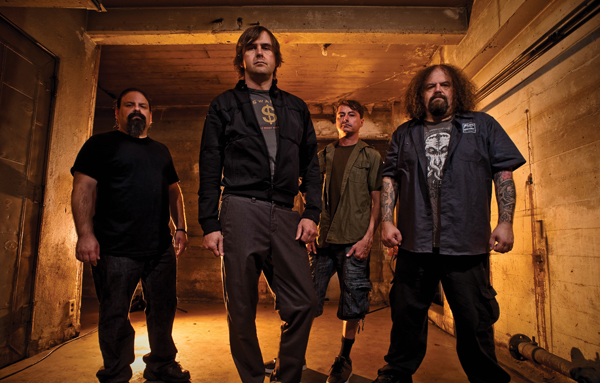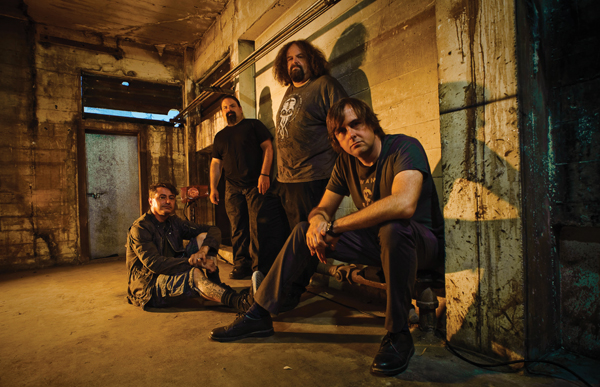NAPALM DEATH
Metal’s Extreme Godfathers Brutalize the Genre’s Boundaries on Latest LP
When one thinks of heavy and extreme music, the first groundbreaking band that immediately comes to mind is Napalm Death. The perfection of their all-encompassing, intensely fierce sound can be summarized as a superb blend of death metal, hardcore punk and prog rock allied with their own unique approach. Their substantially influential and boisterous sound could easily be acknowledged as one of the most quintessential genres of the 20th Century, while they still maintain their innovative and dominatingly powerful legacy into the 21st.
I was able to speak with iconic front man Barney Greenway to get some insights on their 15th studio album APEX PREDATOR- EASY MEAT as well as some background on the Gods of Grindcore’s brilliant and timeless sound.
What are some of the highlighted themes on the new album? I know a certain disaster that resulted in the deaths of slave laborers was a major factor on your songwriting this time out.
Yes, the big catalyst with this album actually stems from a specific event, where a building collapsed in Bangladesh about a year ago and a couple thousand people have either been killed or injured severely for the rest of their lives. It shocked me into wanting to make it the centerpiece of this album and to expose an event like that and other things surrounding slave labor.
The coverage when that whole thing happened was disgraceful. I mean obviously there are disasters from time to time, but taking note of the amount of coverage given to horrible catastrophes in the world, then you just think this one by comparison almost seemed to have minimal coverage. I thought it was a really regrettable and quite nasty thing to think that their lives were considered cheap because of the circumstances. And also a sense of shame to a certain degree, because they manufactured clothes to a lot of people in the West, clothes that are sold at certain shops that you might be buying from, you know?
I think the whole nature of supply chains and manufacturing just has to change. Because if you were to enforce these types of conditions on people in another scenario in life you’d go to prison, no questions asked. This whole globalization process of driving down manufacturing costs just seems to have gotten completely out of control. And actually there was a study within the last few days that suggests that proportionally, the number of people living and working under slave conditions is bigger than it ever has been since things have been recorded. So think about that.
If it could be really gotten through to people to pay a few dollars more to get something that wasn’t manufactured [like this], I think perhaps the culture would change, but again I don’t want to beat people with a stick, you know? I just want to put these things out in the open so people have a better understanding of where their dollars go.
Let’s go back a bit. How did you first develop your trademark vocal sound?
What I would say is you’re motivated by the depth of the things you’re feeling. There’s certain things you’re feeling that give you that level of projection in your voice, but to be honest it just seems to be something anatomic that I’ve got that enables me to do what I do. Some extra little curvature on the throat muscle, it could be even something like that because, I don’t want to sound as if I’m boasting, don’t get me wrong, but there’s a lot of people that I’ve met that just cannot do the style that I do, but to me it just comes entirely natural. It’s just like riding a bike. I sing from the diaphragm. I actually sing from where ‘regular’ singers would and people think I just do it from my throat, but I don’t. It comes from right down in my lungs and then I project it in a certain way using my throat.
What were some of your personal favorite bands growing up?
Well, the first for me really was Motörhead. I mean Ace of Spades is probably my favorite album ever. I just think they were the first extreme band, unintentionally or otherwise, and so I went from there, really. I was always looking for the next extreme after that. And pretty much my next favorite band after that is Discharge and just tons of European, Japanese and American hardcore bands. I honestly wouldn’t even know where to begin and where to end.
What bands would you consider influential to Napalm Death’s sound?
Honestly, there are so many great bands that have influenced us that again, it’s like a never-ending list. Off the top of my head there’s Siege from Boston, Repulsion from Michigan, Steve Austin and Today Is The Day, Celtic Frost, Death, Swans, Killing Joke and countless others.
You have a remarkably charismatic stage presence – what inspires you while singing live?
It’s like flicking a switch and letting the electricity go through. I really get that urge to respond to the music that’s being played through the instruments and if I stand still even for a minute I almost feel like the odd man out, you know what I mean? Because that music is just absolutely barreling away in the background and I feel the need to move. If I stop, I just feel like I’m completely out of place.
Your lyrics are as profoundly intellectual as they are confrontational. What are some of the contributing factors that influence the lyrical content?
Honestly, I don’t really think of [the lyrics] as intellectual. Because you know what, if you try to be too clever and if you try to do things like put in lots of high-brow issues and stuff then you’re really just lying to people. I’m not saying people are too stupid to get some of the political stuff, far from it, in fact; it’s just that not everybody wants to carry a dictionary around when they’re trying to decipher lyrics. I think the way to do it is just use English in a way that’s quite easy to understand but without being generic and just write it creatively. Just use metaphors, use similes, use word play, use comparisons…
I don’t want to seem like an elitist or anything because frankly that would undermine anything we could really put down, so I think it’s important to say that. But to be honest, things just instinctively develop with the lyrics. I’ll take a particular subject and just write it out and incorporate it into the music and I’ll go, ‘OK, that’s a little bit generic, what can I do to just take it up a notch?’
It’s truly a natural process, you know? You just sit down and let it develop without being too over analytical about it.
How do you prepare to go into the studio?
Well, I like to be fully prepared. And in as much as we are spontaneous, I like to be absolutely prepared to go in. And the reason I do that is I want to learn the songs as efficiently as possible. As much natural flow as you can get when you’re singing in the studio, the better result you’ll get, because you don’t have to do take after take after take. The more takes you do, of course the more stilted it becomes and the more mechanical it becomes and the more robotic it becomes…
Napalm Death is such an evolving influential force with modern heavy music; how do you guys manage to re-invent your progressive sound with each new album?
Again, it’s just one of those things where it’s like riding a bike, you sort of just don’t forget really. I know it sounds a bit common and mechanical but really it’s that simple. I don’t want to sound pretentious, but there’s just certain chemistry between the members and when we collaborate on stuff, we all understand each other’s little quirks in terms of writing. I don’t know how to put it any other way; it just really seems to come together perfectly. When we first write the material before we go into the studio, we’re kind of thinking between us, ‘Well, is this stuff going to be any good? Are people going to like it? Is it going to be as good as the last album?’ You try not to but it happens where you ask yourself those questions and somehow it always seems to come out [all right] in the end. Then once you go into the studio there’s almost an extra layer of goodness that seems to just materialize on top of it, and it just works out really well every time.
Follow on Twitter @officialND
photos by Kevin Estrada


